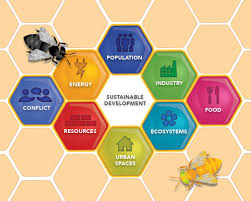The Principles of Sustainable Development
Sustainable development is a concept that has gained significant traction in recent years as societies around the world strive to balance economic growth with environmental protection and social well-being. At its core, sustainable development is about meeting the needs of the present without compromising the ability of future generations to meet their own needs. This overarching goal is guided by a set of key principles that serve as a roadmap for creating a more sustainable future.
Interdependence
One of the fundamental principles of sustainable development is recognizing the interconnectedness of social, economic, and environmental systems. Actions taken in one area can have far-reaching impacts on others, highlighting the importance of considering the broader implications of decisions and policies.
Equity and Social Justice
Sustainable development emphasizes the importance of ensuring fairness and equality for all members of society. This principle calls for addressing disparities in access to resources and opportunities, promoting social inclusion, and safeguarding human rights.
Environmental Stewardship
Central to sustainable development is the principle of environmental stewardship, which entails responsibly managing natural resources, reducing pollution and waste, conserving biodiversity, and mitigating climate change. By protecting ecosystems and minimizing environmental harm, we can safeguard the planet for future generations.
Economic Viability
A key aspect of sustainable development is ensuring economic prosperity while maintaining environmental integrity and social well-being. This principle emphasizes the need for sustainable business practices, responsible investment strategies, and equitable economic growth that benefits both current and future generations.
Participation and Collaboration
Sustainable development thrives on active participation from stakeholders across different sectors – including government, businesses, civil society organizations, and local communities. Collaboration among diverse groups fosters innovation, builds consensus, and drives collective action towards shared sustainability goals.
Conclusion
The principles of sustainable development provide a holistic framework for addressing complex challenges facing our world today. By embracing these principles in our decision-making processes and daily actions, we can work towards building a more resilient, equitable, and thriving society for present and future generations.
Understanding the Core Principles of Sustainable Development: Key FAQs Answered
- What are the five principles of sustainable development?
- What are the 17 principles of sustainable development?
- What are the 7 principles of SDG?
- What are the 10 principles of sustainable development?
- What are the three key principles of sustainable development?
- What are the 5 principles of sustainable development?
- What are the 5 R’s of sustainable development?
- What are the four principles of sustainable development in brief?
What are the five principles of sustainable development?
One frequently asked question regarding the principles of sustainable development is, “What are the five principles of sustainable development?” The five key principles of sustainable development include interdependence, equity and social justice, environmental stewardship, economic viability, and participation and collaboration. These principles underscore the interconnected nature of social, economic, and environmental systems, emphasize the importance of fairness and equality for all members of society, promote responsible management of natural resources and protection of ecosystems, advocate for sustainable economic practices that benefit present and future generations, and highlight the significance of engaging diverse stakeholders in collective efforts towards sustainability goals. By adhering to these principles, societies can strive towards a more balanced and sustainable future.
What are the 17 principles of sustainable development?
The 17 principles of sustainable development, as outlined in the United Nations’ 2030 Agenda for Sustainable Development, encompass a wide range of interconnected goals aimed at promoting prosperity, social inclusion, and environmental sustainability. These principles address key areas such as poverty eradication, gender equality, climate action, responsible consumption and production, and partnerships for the goals. By embracing these principles, countries and communities can work towards achieving a more sustainable and equitable future for all, where economic growth is balanced with social progress and environmental protection.
What are the 7 principles of SDG?
The 2030 Agenda for Sustainable Development, adopted by all United Nations Member States in 2015, includes 17 Sustainable Development Goals (SDGs) aimed at addressing global challenges and promoting sustainable development. While the SDGs do not have specific “7 principles,” they are guided by overarching principles such as interdependence, equity, environmental stewardship, economic viability, participation, and collaboration. These principles underscore the interconnected nature of social, economic, and environmental issues and emphasize the importance of inclusive and sustainable development practices to achieve a more prosperous and equitable world for present and future generations.
What are the 10 principles of sustainable development?
The 10 principles of sustainable development serve as guiding tenets for creating a more sustainable and equitable world. These principles encompass interdependence, equity, environmental stewardship, economic viability, participation, collaboration, accountability, transparency, innovation, and flexibility. By adhering to these principles, societies can strive towards a harmonious balance between economic prosperity, social well-being, and environmental protection. Each principle plays a crucial role in shaping policies and practices that promote long-term sustainability and resilience in the face of global challenges such as climate change, resource depletion, and social inequality.
What are the three key principles of sustainable development?
When exploring the key principles of sustainable development, three fundamental pillars emerge as guiding principles: environmental stewardship, social equity and justice, and economic viability. Environmental stewardship emphasizes the responsible management of natural resources and ecosystems to ensure their preservation for future generations. Social equity and justice call for fair distribution of resources, opportunities, and benefits to all members of society, promoting inclusivity and human rights. Economic viability underscores the importance of sustainable economic growth that balances prosperity with environmental and social well-being, aiming to create a resilient economy that benefits present and future generations alike. These three principles form the foundation of sustainable development efforts worldwide, shaping policies and actions towards a more sustainable and equitable future.
What are the 5 principles of sustainable development?
The five key principles of sustainable development provide a comprehensive framework for achieving a harmonious balance between economic progress, environmental protection, and social well-being. These principles include interdependence, recognizing the interconnected nature of social, economic, and environmental systems; equity and social justice, ensuring fairness and inclusivity for all members of society; environmental stewardship, promoting responsible management of natural resources and biodiversity conservation; economic viability, pursuing sustainable economic growth that benefits present and future generations; and participation and collaboration, engaging diverse stakeholders in collective efforts to address sustainability challenges. Adhering to these principles is essential for fostering a more sustainable world that meets the needs of both current and future generations.
What are the 5 R’s of sustainable development?
The 5 R’s of sustainable development are Reduce, Reuse, Recycle, Rethink, and Refuse. These principles serve as a guiding framework for promoting environmental sustainability and responsible resource management. By reducing consumption, reusing materials, recycling waste, rethinking our habits and practices, and refusing unnecessary or harmful products, individuals and communities can contribute to a more sustainable future. Embracing the 5 R’s not only minimizes environmental impact but also fosters a culture of conservation and mindfulness towards our planet’s resources.
What are the four principles of sustainable development in brief?
The four key principles of sustainable development can be summarized as interdependence, equity and social justice, environmental stewardship, and economic viability. Interdependence highlights the interconnectedness of social, economic, and environmental systems, emphasizing the need to consider the broader impacts of decisions. Equity and social justice call for fairness and inclusivity in resource distribution and opportunity access. Environmental stewardship underscores responsible management of natural resources and protection of ecosystems. Economic viability focuses on achieving prosperity while maintaining environmental integrity and promoting sustainable economic growth for present and future generations. These principles collectively guide efforts towards a more balanced and sustainable approach to development.




